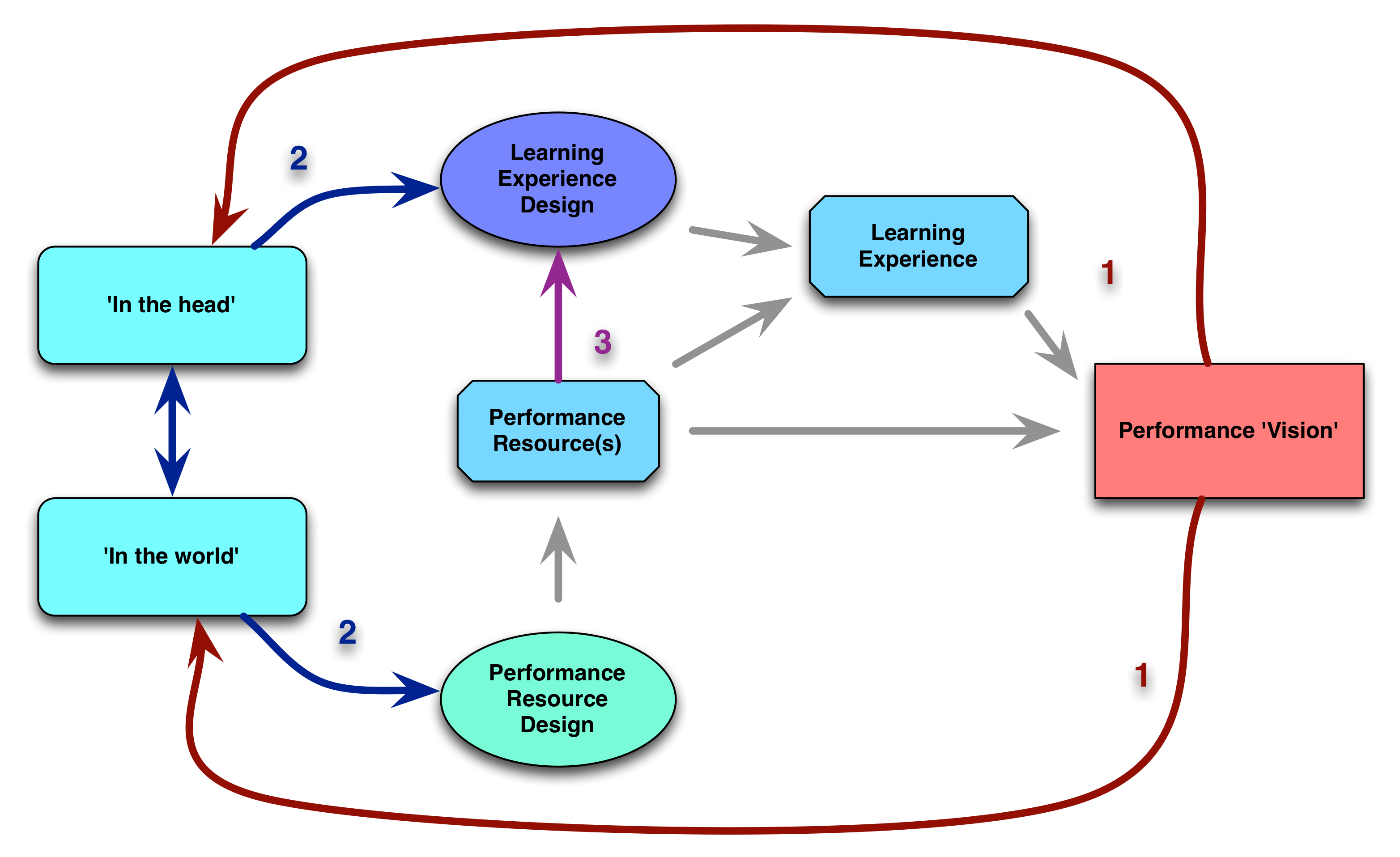A couple of months ago, I posted on thinking about designing, calling for designing ‘backwards and forwards’. And it’s continued to percolate, rightly or wrongly.
As I originally structured it, you worked backwards (1) from the ultimate performance you need to put information in the head, and in the world, and then designed forward (2) the combined learning experience, and the performance resource. While the HPT movement thinks about this as well (they definitely talk about whether it should be a learning or performance support solution; I don’t know but assume they will do a mix if needed). Which I don’t disagree with, but I realized I needed to address one issue.
 It occurred to me that when you design your resource(s), that has to happen first. If there are resources, they should be included in the learning experience. That is, you want to provide practice with the resources as part of the learning experience to develop the performer’s ability to use the resources in the performance situation.
It occurred to me that when you design your resource(s), that has to happen first. If there are resources, they should be included in the learning experience. That is, you want to provide practice with the resources as part of the learning experience to develop the performer’s ability to use the resources in the performance situation.
Thus, I’ve ended up redesigning it such that performance resource(s) influence the learning experience design (3), and are available in the learning experience as well as in the performance environment. It’s more complex, but more accurately captures the types of thinking we need to have as designers. We need to create what’s in the world and then prepare what’s in the head to accommodate the new performance environment.
Which, of course, may actually need to be iterative. As Atul Gawande points out in his book, his checklists were rigorously trailed and refined. That sort of evaluation and revision should be part of our ongoing processes too. We shouldn’t assume we’ll get it perfect the first time. And the existing environment prior to our intervention will also factor into our resource and experience design.
That said, does this conceptualization help? I’m trying to find ways to represent design that helps reduce our overemphasis on all training being about trying to put everything ‘in the head’, and this, combined with my earlier thoughts on learning experience design, is part of my ongoing effort. If, however, it’s either too confusing, or already common knowledge, I need to work more. Feedback?
With regard to human performance technology, I’d agree on the general idea of working backwards: you begin with the gap between optimals and actuals (as Allison Rossett put it); you look for possible causes in the area of information, tools, and incentives (on both the individual and the organizational level), and you look for evidence of those causes before you decide, well, looks like a Training Problem.
I don’t know that I’d say “we have to create what’s in the world” so much as “we need to provide it, or a really good equivalent.” This is a bit of a quibble, but I am more and more leery of the self-regard that some designers have: they’re sure they can reproduce everything necessary, instead of using things that already exist.
I know you well enough to realize this isn’t your intention; I’m just skeptical about “creating” what’s in the world. On most days, I’d be delighted to come reasonably close to a believable approximation of a meaningful chunk of what’s in the world.
Otherwise, you end up with yet another simulation that spins its wheels recreating inconsequentials, the way a lot of office-building metaphors forced people to go through imaginary doors and ride on imaginary elevators before sitting at imaginary desks and opening imaginary drawers.
Surely somewhere there’s someone looking for his imaginary stapler.
I think your focus on the Performance Resource is key. part of the learning experience should be about making the best use of the resource. Also, designing the resource so it is integral to the performance. Eventually a grocery store cashier will remember the product #s for most of the fruits and vegetables, but in the training and in the early experience, they need to focus more on how to ring up the item correctly, not memorize the product #. Thus, the look up screens on the registers. And everyone will run into vegetables or fruits that are rare at the register.